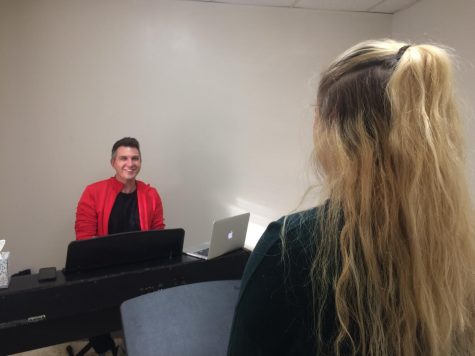Hopes for improvement in Dayton’s theatre community
Part II of III

Philip Drennen instructs a vocal student at Singing Elephant Studios in Downtown Dayton.
While Dayton’s creative community does provide many benefits, there is always room for improvement.
“I will say, and I don’t mean this in a negative way, that there might be a bit of a disconnect between what you’d call a professional theatre as opposed to community theatre,” Philip Drennen, local actor and voice teacher, said.
Integrating all aspects of the community, especially within the theatre scene itself, is one of the things that makes this city so unique in its dynamic. When people are resistant to that aspect of the community, sometimes that can cause an impediment to the great things that it could be bringing.
“For the most part I think it’s a pretty supportive community because of its individuals, but when you start talking about theatre at a higher level, people are not as open to working together as I wish they were,” Becki Norgaard, executive director of Dare2Defy productions, said. “It almost feels competitive in a field that shouldn’t be competitive. There’s plenty for everybody.”
The competition may be occasionally felt between theatre companies, but another factor is the smaller theatre-going population. Dayton’s relatively smaller size means that there are only so many people to draw into the seats.
“The competition is only in the fact that there’s only so much audience. Yes, we’re all competing for an audience,” Kevin Moore, artistic director of the Human Race theatre company, said.
The smaller community, while closely tied, makes it harder to allocate funds for the full level of production that some groups may be capable of if they had the resources.
“Just from working with the Playground and Dare2Defy, they put out this great product and they have such great talent and I wish they had more money,” Drennen said. “Not to give the actors, but just to be able to put on the vision in their head whether it’s set, costumes, [or] renting theatre spaces.”
Despite these obstacles, the community still remains tightly knit and encouraging to one another. Moore notes that the best thing to do to maintain the success of the performing arts in Dayton is ensure that everyone is able to continue producing a good product.
Moore said, “I want everyone’s show to be good because if somebody goes to a theatre and has a bad experience they might not come back to any. I want them to have a good experience so they can keep having a good experience wherever they go. That encourages audience members to come.”
Dayton also has a huge wealth of opportunity to use their community theatre programs to provide an outlet for those who may not have access to it at school or at home.
“I’ve done theatre in a lot of places and I’ve never seen anything quite like the community here. The way it’s different is we have all these great programs for younger people like Stivers and Muse Machine and there’s a lot of great high schools that have really great programs,” Norgaard said.
While Dayton already has a foundation for providing opportunities to do theatre in high school, there is still room to expand. Extending the learning experience that youth productions provide to individuals who don’t have access to those spaces can allow more and more individuals to become a part of the downtown arts community and reap the benefits of being part of a creative group.
“I think the opportunity that Dayton has is to make theatre education and training for younger people more accessible for school districts that don’t necessarily have programs, or in areas where people don’t have money to pay to participate in dance classes or voice lessons or pay to play theatre because those are the people who need it the most,” Norgaard said.
Expanding the community is something that is beneficial to every aspect of the performing arts in Dayton. Greater involvement allows people to have experiences that they wouldn’t have anywhere else, and brings more people to see the work of people performing in the Dayton area.
“There are so many people in Dayton who have never darkened the door of any theatre,” Moore said. “Either it wasn’t there in there school or they had no connection to it or their parents never took them to the theatre, and that’s always intimidating to people. I always say there’s nothing intimidating about it just go.”
To read Part I of this series click here
To read Part III of this series click here






